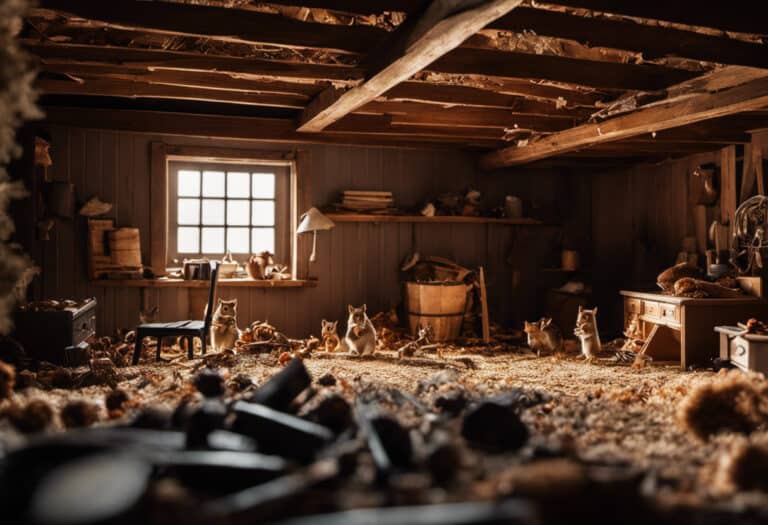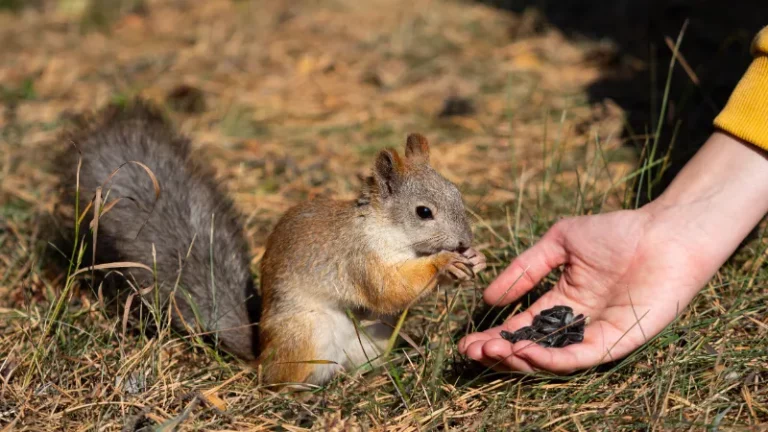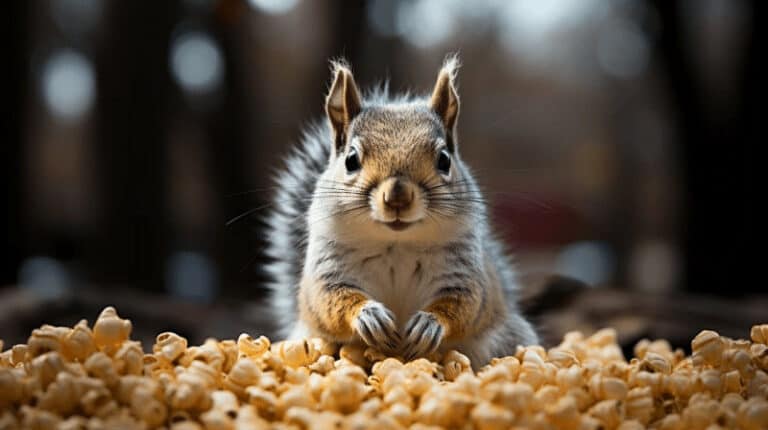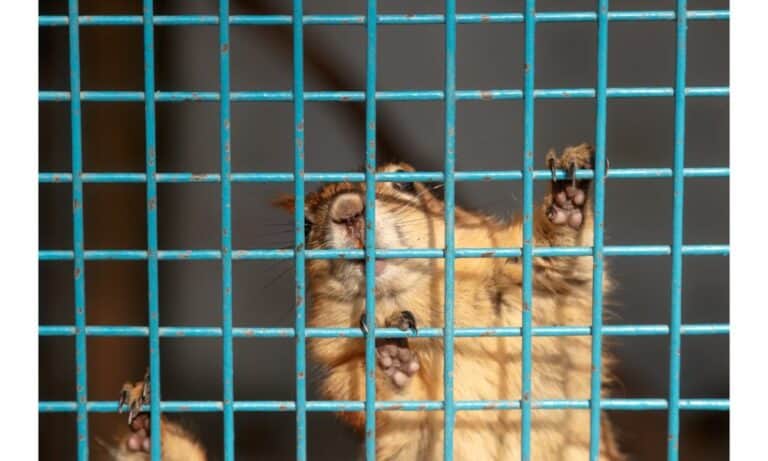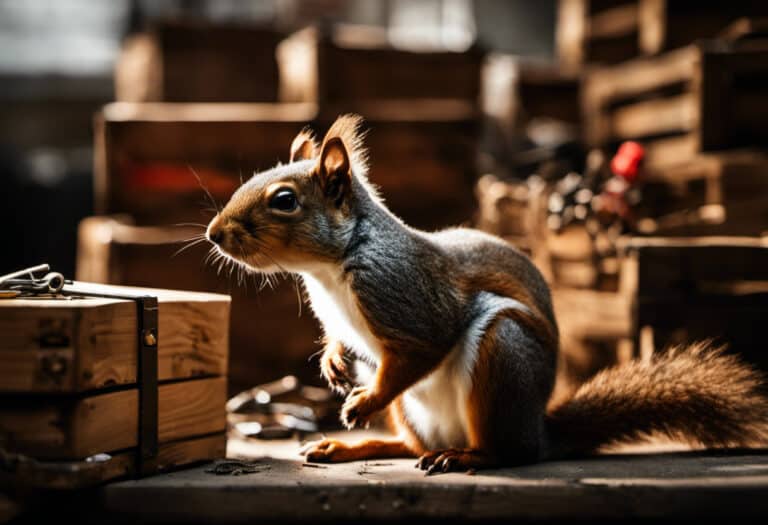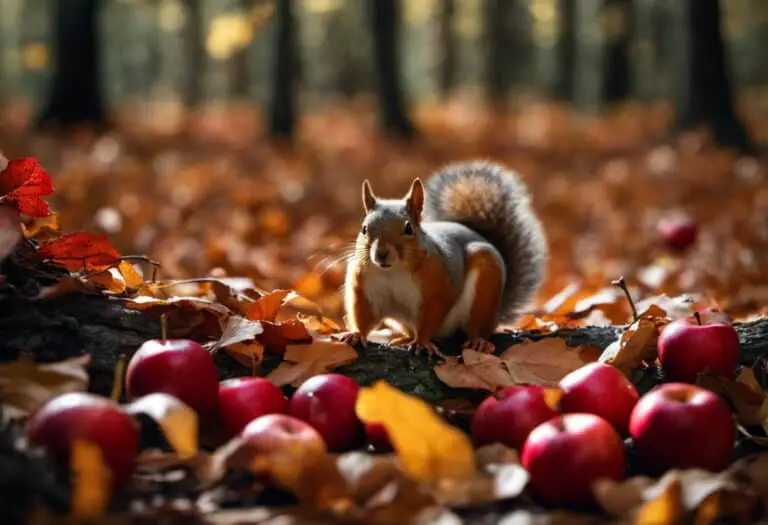Are squirrels Dangerous? Should You Avoid Them?
Are you curious about the potential dangers squirrels might pose? Wondering if encounters with these furry creatures can be risky?
It’s important to understand that while squirrels are generally harmless, there are instances where caution is warranted. We’ll debunk common misconceptions surrounding squirrel behavior and shed light on the need to assess danger levels appropriately.
By gaining insights into squirrel behavior patterns, you’ll be better equipped to navigate encounters with these critters safely and informally.
If you’re seeking useful insights on whether or not squirrels pose a threat to humans and how to evaluate the risks involved, you’ve landed on the right page. Let’s explore this topic together!
Understanding squirrel behavior and potential threats
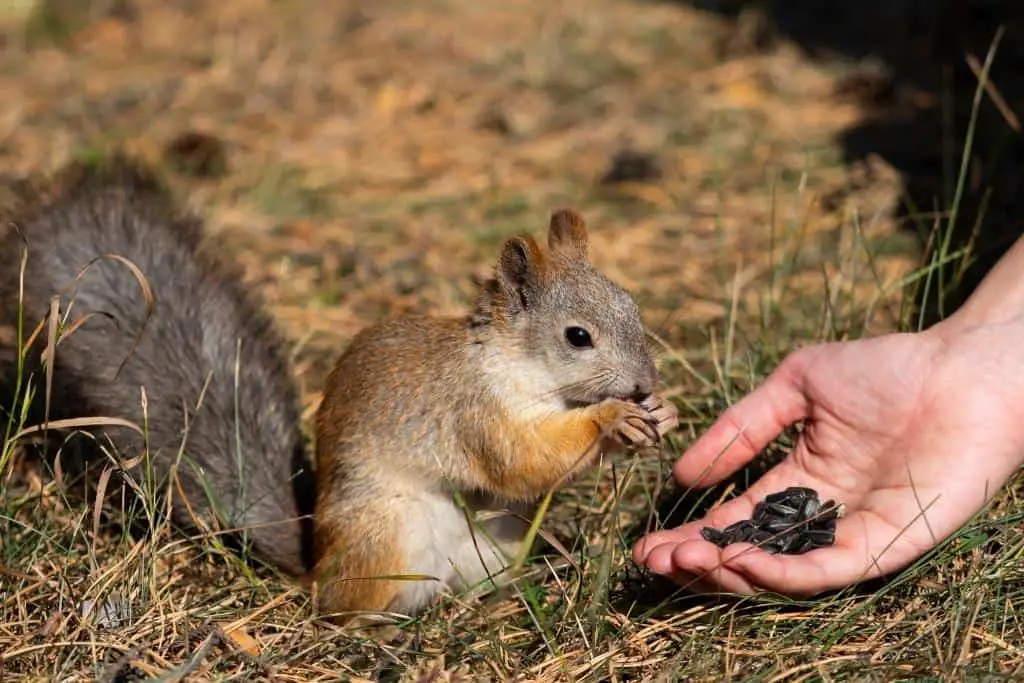
Squirrels, those small and graceful creatures that often scurry across our yards and climb trees, may seem harmless at first glance.
However, it’s essential to understand their behavior and the potential threats they can pose.
By examining their natural behaviors in their habitats, we can understand why squirrels may become a nuisance in certain areas and how they can impact our property, gardens, bird feeders, and other wildlife.
Examining the natural behaviors of squirrels in their habitats
We must closely examine their instincts to comprehend the reasons behind squirrel behavior. Squirrels are members of the rodent family known for their tree-dwelling habits.
They have sharp claws that enable them to climb effortlessly and agile bodies that allow them to quickly leap from branch to branch. These adaptations have helped them survive in various environments around the world.
One key aspect of squirrel behavior is their constant need to gather food. Squirrels are notorious hoarders; they collect nuts, seeds, fruits, and other edible items during times of abundance to ensure a steady food supply during leaner periods.
This instinct also drives them to search for food sources near human settlements.
Identifying potential threats posed by squirrels to property and gardens
While squirrels may be fascinating creatures to observe from afar, they can become problematic when they start causing damage to our property and gardens.
One common issue is their tendency to dig holes in lawns while burying or retrieving food caches. These holes create an unsightly appearance and pose a tripping hazard.
Moreover, squirrels have a penchant for chewing on various objects due to the continuous growth of their incisor teeth. This habit can lead them to gnaw on wooden structures such as fences or electrical wires within homes, posing significant fire hazards.
How squirrels can become a nuisance in urban areas
As urbanization continues encroaching upon natural habitats, squirrels have adapted to living near humans. While this ability to thrive in urban environments is impressive, it also means that they can become nuisances.
Squirrels may raid bird feeders, stealing the seeds intended for our feathered friends. Their acrobatic skills allow them to access even the most well-designed feeders, leaving little sustenance for birds.
Their fondness for gardens and fruit trees presents another challenge. Squirrels are adept at stealing ripe fruits and vegetables from gardens, frustrating gardeners who put time and effort into cultivating their crops.
The impact of squirrel activity on bird feeders and other wildlife
The presence of squirrels can disrupt the delicate balance of ecosystems, particularly.
Smaller birds may struggle to find enough food when squirrels dominate bird feeders, leading to a declining population. This imbalance can have far-reaching consequences since birds play crucial roles in pollination and insect control.
Furthermore, squirrels compete with native species for nesting sites and food sources. In some cases, invasive squirrel species can outcompete indigenous ones, leading to a decrease in biodiversity.
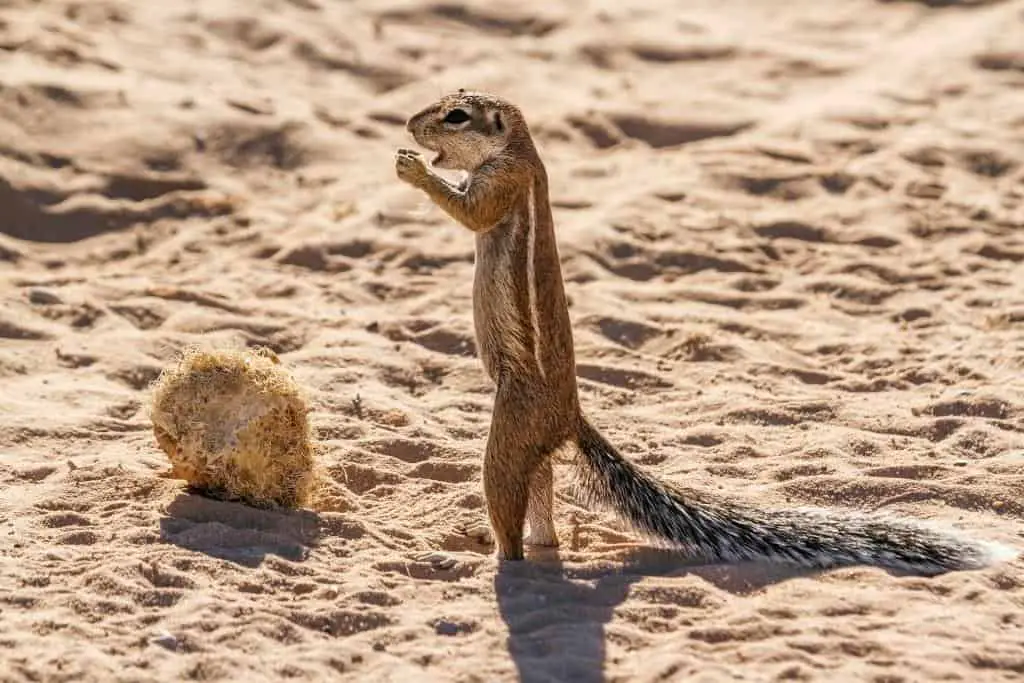
Do squirrels bite humans?
Squirrels, those adorable little creatures that scurry about in parks and backyards, are generally not known for biting humans.
However, there are instances where human-squirrel interactions can lead to bites. Let’s explore this topic further and understand the factors contributing to aggressive behavior in squirrels.
Are squirrels prone to biting humans?
While it is uncommon for squirrels to bite humans, it is essential to remember that they are still wild animals.
Like animals, they may resort to defensive measures if they feel threatened or cornered. Squirrels have sharp teeth, primarily for cracking nuts and other food sources. In rare cases, when provoked or startled, a squirrel may bite for self-defense.
Can human-squirrel interactions lead to bites?
Human-squirrel interactions that involve feeding or attempting to touch these animals can sometimes result in bites.
When people feed squirrels regularly, the animals become accustomed to approaching humans for food. This can blur the boundaries between wild animals and their natural fear of humans.
Attempts by people to handle or pet squirrels can also provoke them into biting. Squirrels are naturally skittish creatures and prefer maintaining distance from larger beings like humans.
Factors that contribute to aggressive behavior in squirrels
Several factors contribute to aggressive behavior in squirrels:
- Maternal Instincts: Mother squirrels are highly protective of their young ones and may become aggressive if they perceive a threat nearby.
- Territorial Behavior: Squirrels mark their territories using scent glands and will defend them against intruders.
- Disease or Injury: Sick or injured squirrels may exhibit unusual aggression due to pain or discomfort.
- Lack of Food: When food becomes scarce, competition among animals increases, leading some squirrels to display aggression towards humans.
Clarifying the likelihood of being bitten by a squirrel
While it is essential to exercise caution around squirrels, the possibility of being bitten by one remains relatively low.
Most squirrels will choose flight over fight when confronted with humans. They prefer to flee or find an escape route rather than engage in aggressive behavior.
It’s worth noting that squirrels are generally harmless and play a vital role in ecosystems by dispersing seeds and controlling insect populations.
As long as we respect their space and refrain from feeding or attempting to handle them, our interactions with these adorable creatures can be enjoyable without the risk of bites.
Health risks associated with squirrel bites
Squirrel bites may seem harmless, but they can pose several health risks. It is essential to be aware of the potential issues arising from these bites and take appropriate measures to protect yourself.
One significant concern. Rabies is a viral disease that affects the central nervous system and can be fatal if left untreated. While rare in squirrels, they are not immune to rabies. They can transmit the virus through their saliva when biting humans or other animals.
Therefore, seeking medical attention immediately after a squirrel bite is crucial to assessing rabies transmission risk.
Another disease associated with squirrel bites is tularemia or rabbit fever. This bacterial infection is caused by Francisella tularensis. It can be transmitted through direct contact with infected animals or their carcasses.
Squirrels may carry this bacterium, making their bites a potential source of infection. Symptoms of tularemia include fever, fatigue, swollen lymph nodes, and skin ulcers at the site of infection.
Seeking medical attention after a squirrel bite is essential for several reasons. First and foremost, a healthcare professional will evaluate the wound’s severity and determine if any immediate treatment or preventive measures are necessary.
They may recommend cleaning the damage thoroughly with soap and water or prescribe antibiotics to prevent infection.
Medical professionals can administer post-exposure prophylaxis (PEP) for rabies if deemed necessary based on an assessment of the situation.
PEP involves receiving a series of injections over several weeks to prevent rabies from developing in case there is exposure to the virus.
Preventive measures play a crucial role in minimizing disease transmission from squirrel bites:
- Avoid feeding squirrels or encouraging their presence in residential areas.
- Do not attempt to handle or touch squirrels, especially if they appear aggressive or sick.
- If you encounter a squirrel that seems injured or behaving strangely, contact local animal control authorities for assistance.
- Keep your pets away from squirrels to reduce the risk of bites and potential disease transmission.
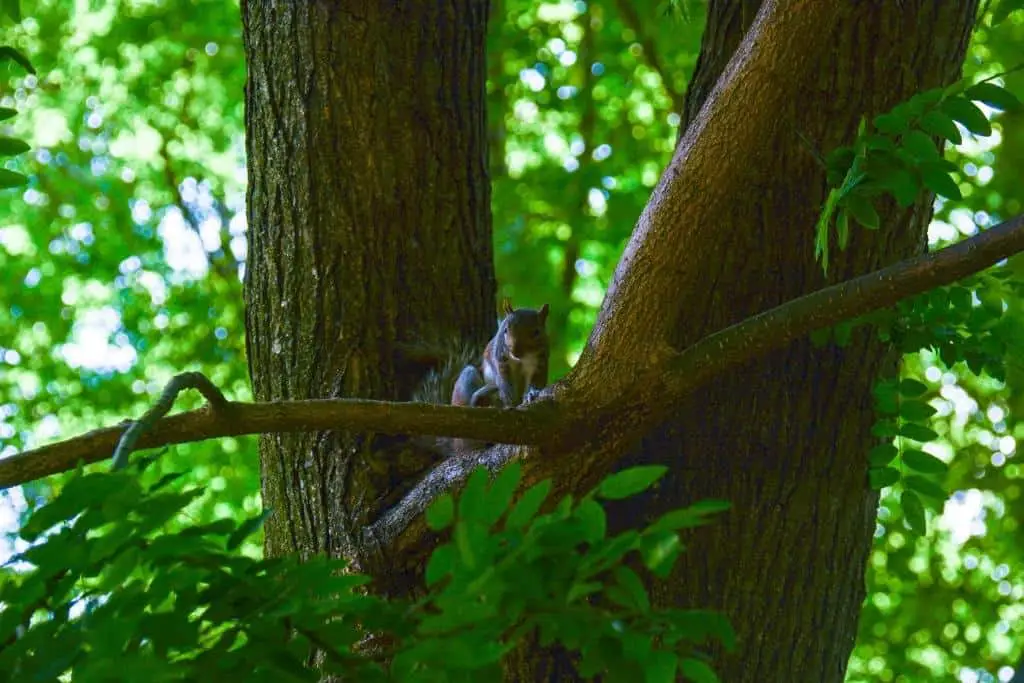
Preventing squirrel infestation in your backyard
Deterring squirrels from entering your property is crucial to avoid a squirrel infestation. These pests can cause damage to your yard, attics, and even homes if left unchecked.
Here are some effective methods to secure your property and keep pesky squirrels at bay.
Securing bird feeders and gardens
Bird feeders are a common attraction for squirrels, who see them as an easy food source.
Consider using a baffle to prevent these critters from raiding your bird feeder. A baffle is a device that blocks the squirrel’s access to the feeder while allowing birds to enjoy their meal undisturbed. Place the baffle below or above the feeder to deter squirrels from climbing up or down.
Safeguarding your garden is essential in preventing squirrel infestations. Squirrels are known for digging up bulbs and munching on plants. Protect your garden by fencing it off with wire mesh or using chicken wire around individual plants that are particularly vulnerable.
Making your yard less attractive to squirrels
Creating an unappealing environment for squirrels can discourage them from making themselves home in your yard.
One way to achieve this is by removing potential food sources that might attract them. Clean up fallen fruits and nuts regularly, as these act as magnets for hungry squirrels.
Trimming tree branches away from structures like houses and fences can also make it harder for squirrels to access rooftops or attics where they may seek shelter. Eliminating easy entry points reduces the likelihood of a squirrel entering your home.
Removing food sources that attract them
Squirrels have a keen sense of smell and will be drawn towards areas where they detect readily available food sources.
Take steps to eliminate these temptations by properly storing pet food indoors in sealed containers or keeping it elevated off the ground. Ensure your garbage cans are tightly sealed to prevent squirrels from rummaging through them.
The Danger of Backyard Squirrels
Understanding that these cute and furry creatures are generally harmless is essential. However, there are instances when their activities can become a cause for concern.
When backyard squirrel activity becomes a concern
Backyard squirrels are typically harmless and add a touch of liveliness to our outdoor spaces. However, certain situations may warrant closer attention.
One such scenario is when their behavior becomes aggressive or overly territorial. Squirrels are known for being protective of their nests and food sources. Still, it could be dangerous if they start attacking humans or other animals.
Another consideration is the potential damage caused by nesting or burrowing activities.
Squirrels often build nests in trees or attics, which can lead to structural damage if left unchecked. Their burrowing habits may also disrupt gardens or create lawn holes, posing tripping hazards for unsuspecting individuals.
Signs of Squirrels in your backyard
To determine whether backyard squirrel activity poses an increased risk, it’s crucial to be aware of sure signs.
One indication is an unusually high number of squirrels congregating in your yard. While seeing one or two squirrels is expected, an abundance may suggest an infestation or overpopulation issue.
Keep an eye out for aggressive behavior towards humans or pets. If you notice squirrels consistently approaching you with hostility or attempting to bite, it might be time to take precautions.
Potential damage caused by nesting or burrowing activities
Squirrels are resourceful creatures that often seek shelter in our homes and yards. While their presence can be endearing at first glance, their nesting and burrowing activities can lead to significant damage.
For instance, squirrels may chew through electrical wiring in attics or create holes in roofs, causing water leakage and subsequent structural issues.
Moreover, their burrowing habits can disrupt gardens and damage underground utility lines. This poses a risk to the well-being of your plants and increases the chances of accidents such as gas leaks or electrical malfunctions.
Situations where professional intervention may be necessary
In most cases, handling backyard squirrel concerns can be managed by homeowners themselves. However, there are situations where professional intervention becomes necessary.
Suppose you have attempted various deterrent methods without success, or the infestation has reached unmanageable levels. In that case, you should seek assistance from pest control experts or wildlife removal services.
Professional intervention is especially crucial when dealing with aggressive squirrels that pose immediate risks to human safety. These experts possess the knowledge and tools required to handle such situations effectively while ensuring the well-being of humans and animals.
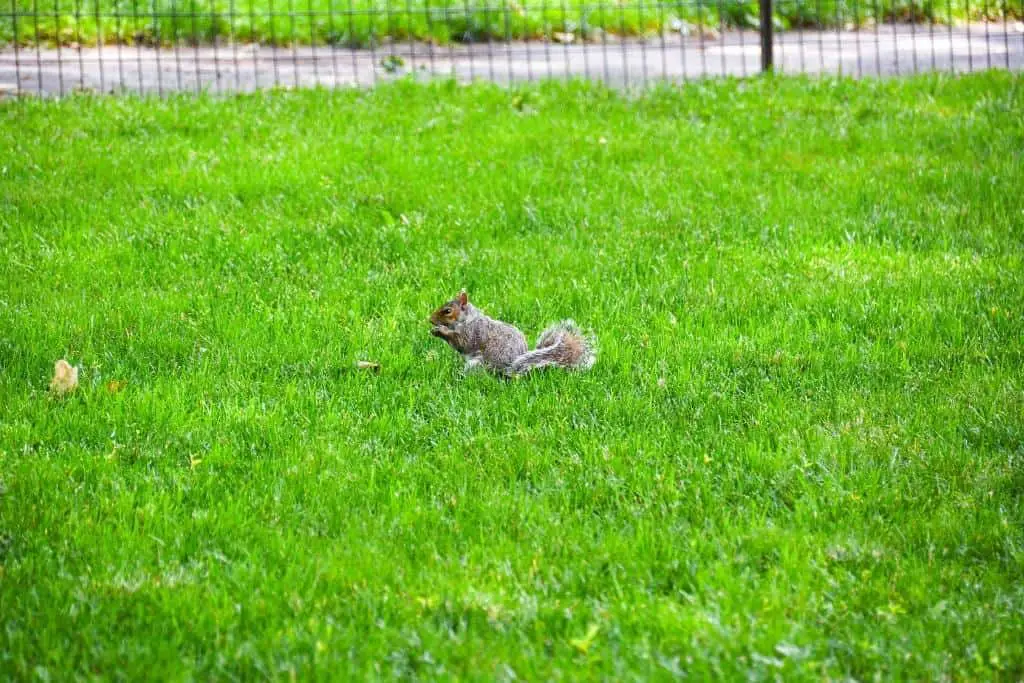
Seeking professional help for squirrel control
It’s vital to assess the situation and determine whether seeking professional assistance is necessary. While some instances of squirrel presence can be managed on your own, there are scenarios where bringing in wildlife control experts becomes essential.
Scenarios where professional assistance is recommended
- Infestation: If you find yourself facing a significant squirrel infestation, it’s advisable to contact professionals. They have the expertise and experience to handle large numbers of squirrels efficiently.
- Structural damage: Squirrels can cause extensive damage to your property by chewing through wires, insulation, and even wooden structures. When the structural integrity of your home or business is compromised, it’s best to rely on professionals who can mitigate the damage effectively.
- Nesting inside buildings: Squirrels sometimes create nests within attics, crawl spaces, or other areas of your property that are difficult to access. In such cases, professionals have the necessary tools and techniques to safely remove them without causing harm.
Services provided by wildlife control experts
Wildlife control experts offer services tailored specifically for squirrel removal and prevention. These services include:
- Inspection: Professionals will thoroughly inspect your property to identify entry points and potential nesting sites.
- Humane trapping: Using traps explicitly designed for squirrels, experts will capture them safely without causing unnecessary harm.
- Exclusion methods: Wildlife control experts employ techniques like sealing entry points with wire mesh or metal flashing to prevent future intrusions.
- Sanitization and cleanup: After removing squirrels from your property, professionals will clean up any mess left behind and sanitize affected areas.
Benefits of humane squirrel removal methods
Choosing humane methods for squirrel removal ensures the well-being of these creatures and benefits you as a homeowner. Some advantages include:
- Ethical treatment: Humane squirrel removal methods prioritize the safety and welfare of the animals. By opting for these methods, you contribute to wildlife conservation efforts.
- Reduced stress: Professionals trained in humane techniques can remove squirrels without causing unnecessary distress to the animals and yourself.
- Prevention of re-infestation: Wildlife control experts implement strategies that remove squirrels and help prevent future infestations by identifying and addressing potential entry points.
Legal considerations when dealing with squirrel control
Knowing the legal regulations surrounding squirrel control in your area is crucial. While laws may vary, harming or killing squirrels without proper permits is generally illegal.
Therefore, seeking professional assistance ensures compliance with local wildlife regulations.
FAQs
Can squirrels transmit diseases?
Squirrels can transmit diseases through their bites or scratches. Some common conditions include rabies, tularemia, and Lyme disease. It is crucial to seek medical attention if you have been bitten or scratched by a squirrel.
Are there any natural deterrents for keeping squirrels away?
Yes! Some natural deterrents include using strong-smelling substances like peppermint oil or vinegar around areas where you want to keep squirrels away.
What should I do if I find a baby squirrel?
If you find a baby squirrel alone without its mother nearby, observe from a distance for at least an hour before intervening. The mother may be out searching for food but will return to care for her baby. Contact a local wildlife rehabilitation center for assistance if it appears injured or abandoned.
Can I feed squirrels in my backyard?
Feeding squirrels can attract them to your property and potentially lead to infestation. It is generally recommended not to feed wild squirrels as it disrupts their natural behavior and may cause dependency on human-provided food sources.
